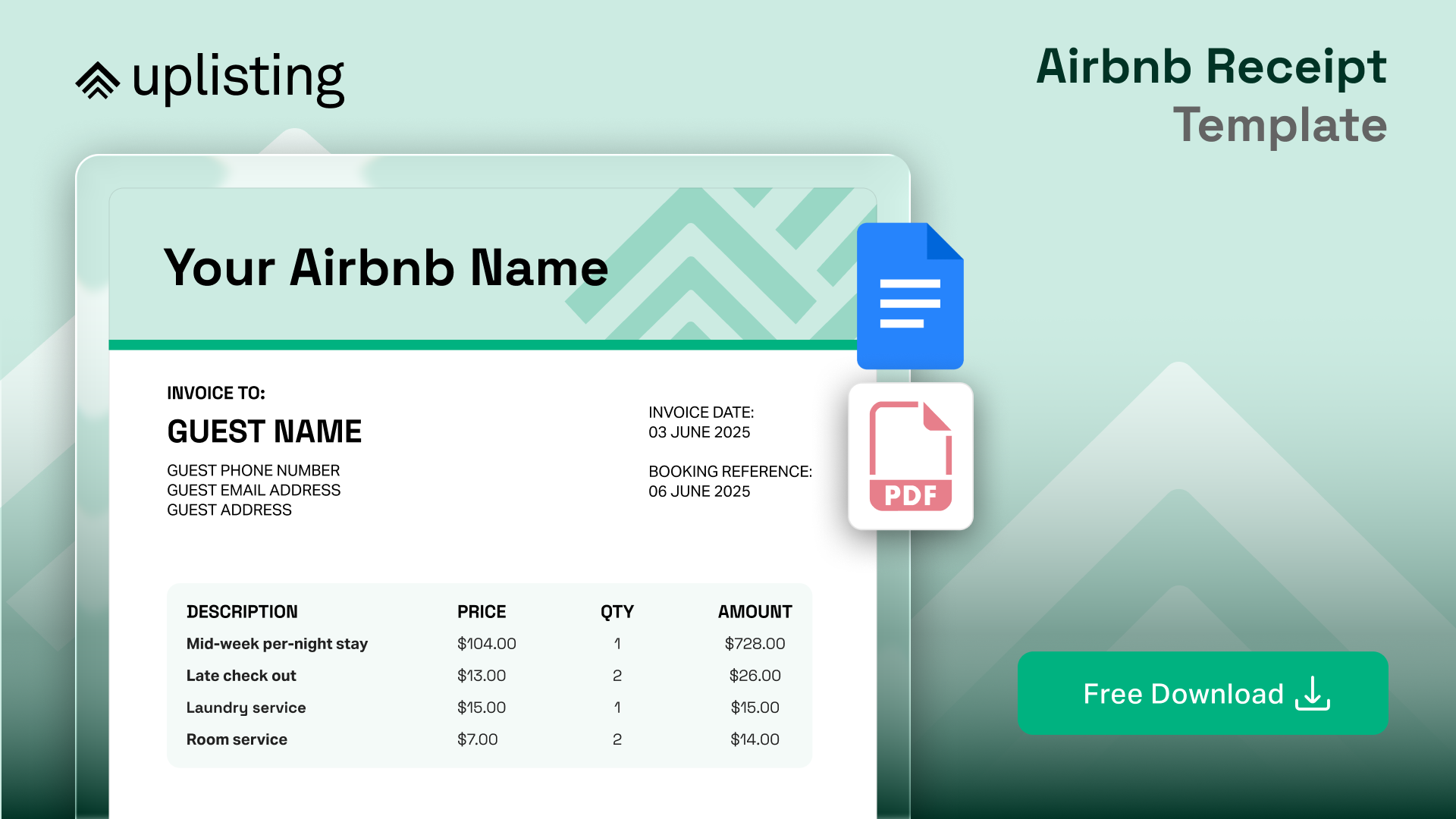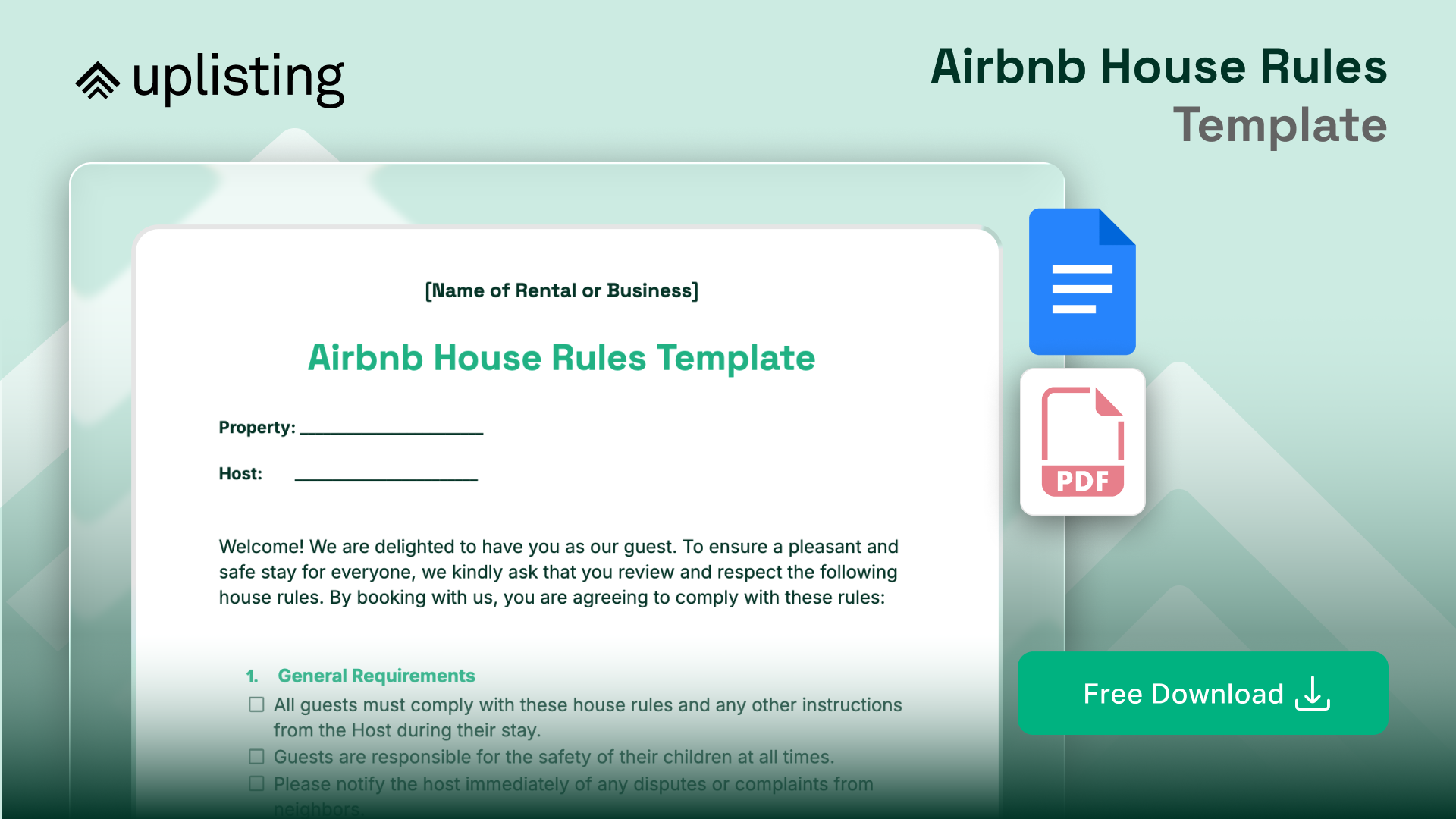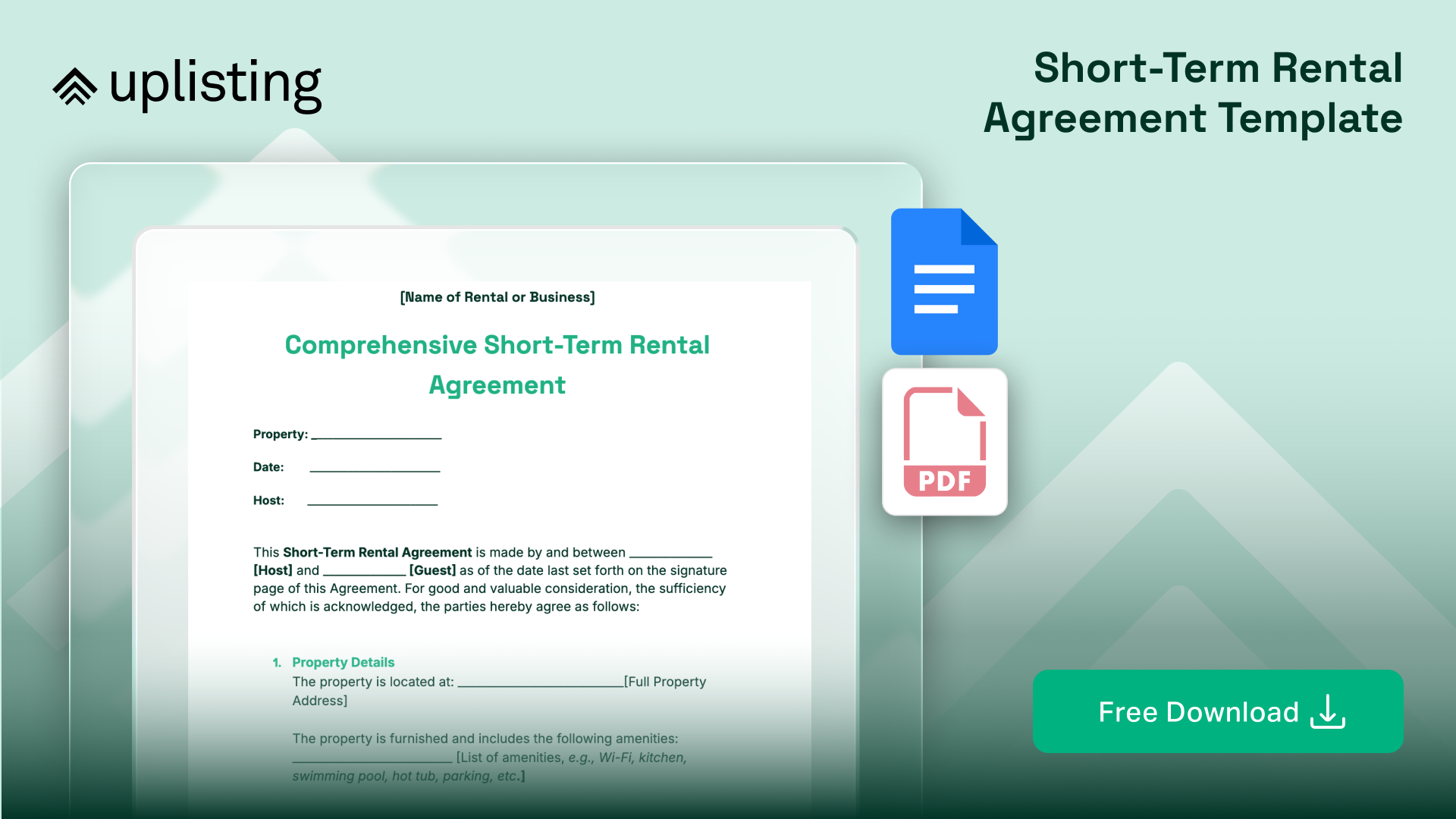Key Takeaways
Growing your portfolio requires a mix of owner outreach, marketing and smart operations, especially if your cash doesn't stretch to another down payment.
Building trust with property owners is just as important as guest experience as you add listings to your portfolio.
Leveraging tech and partnerships helps scale efficiently without burning out, which is a must as your portfolio grows.
Nothing beats the feeling of a fresh check from Airbnb rolling in. When you've seen the potential of short term rental property, it's only natural to start hunting for your next property listing.
However, scaling from one or two properties to a real portfolio isn’t simply a numbers game, rather it requires a shift in how you operate.
Adding more listings means more guests, more turnovers, and more moving parts to manage. Without a plan, it’s easy to get overwhelmed and risk slipping on guest communication, reviews, or pricing; the very things that make your first property successful.
In this blog, we’ll share 9 proven methods to get more Airbnb listings and scale your business with confidence.
Why Smart Hosts Focus on Growing an Airbnb Portfolio
Scaling a short-term rental business is an opportunity to run smarter.
Each added property brings new revenue, stronger operational leverage, and fewer gaps in your calendar. Hosts who treat growth like a business (not a side gig) are the ones building something sustainable.
More listings, more momentum
Adding properties increases revenue, sure, but it also builds rhythm.
With more listings, you start to notice patterns: which systems break, which cleaners show up late, which units always book up first. That information helps you streamline operations and make better decisions, fast.
Once you're managing multiple rentals, you can start negotiating better vendor rates, batching turnovers, and spreading fixed costs across more properties. Even small gains in occupancy or average daily rate (ADR) start to compound when scaled across several units.
Building a brand worth rebooking
A consistent guest experience becomes easier when you have more control over the details, like excellent furnishings, perfect communication, a super-smooth check-in process, and expert follow-up that welcomes repeat business.
Those repeat bookings are cheaper to acquire and often easier to manage. Guests who’ve stayed with you before are less likely to be high-maintenance and more likely to leave strong reviews. Not to mention, when you build a recognizable brand across multiple listings, owners start to notice. They want their properties managed by someone who runs a professional, well-reviewed operation, too.
Running it like a business, not a side hustle
Managing a couple of listings can feel like extra income. Managing six or more is a business. That change requires discipline and a fresh approach.
Suddenly, your day-to-day is more about calendar control, guest messaging, owner reporting, and financial tracking than putting out fires and fielding last-minute guest issues. To run a successful business, you need to implement systems that scale, not guesswork / manual processes that break when bookings spike.
The upside? More listings mean more leverage and more data. You can test pricing strategies, run promotions during low seasons, and see what actually drives bookings instead of guessing, meaning tangible changes to your bottom line over the long run. When everything runs smoothly, you’re in a better position to pitch co-hosting deals, attract investor-owned properties, or take over underperforming units from overwhelmed hosts.
Growth only works if quality holds
As we get swept up in the desire to grow, remember the reality behind the numbers: Guests don’t care how many properties you run, they care whether the Wi-Fi works, the sheets are clean, and they get clear instructions.
Hosts who grow fast without a plan end up with angry guests and burned-out teams.
Consistency matters most when scaling. Standardize check-in, cleaning, and guest messaging so every stay feels just as polished as the last. Owners notice. Guests remember.
That’s how to get more Airbnb listings; by proving you can scale without cutting corners.

All-in-one Vacation Rental Software and Channel Management System
Get started in seconds by connecting Airbnb
Manage short-term rentals & bookings, message guests, take payment, and so much more. All in one easy-to-use platform (that never double-books).
9 Proven Methods to Get More Airbnb Listings
Building a portfolio doesn’t happen by accident. Here are 9 ways you can get more Airbnb listings without dropping the cash for the deposits yourself.
#1 Tap into your network first
Start with people who already trust you, friends, former coworkers, your neighbor with a second home they rarely use.
Offer to manage their place while they’re out of town for the holidays. Make it clear they aren’t stuck in a long-term agreement. You’re giving them a no-pressure look at how much they could earn, and how little they’d need to do.
If the numbers look good and the guest reviews roll in, most won’t want to take the reins back.
#2 Approach property owners directly
Every neighborhood has empty units or rentals that barely break even. Look for long-term listings that sit vacant or homes pulled off the market after failing to sell, then reach out. Let owners know you specialize in short-term rentals, lay out the income differences, and show how you take care of everything, from guest communication to cleanings.
Focus on how much time they’ll save, how much stress they’ll avoid, and how you turn a liability into income.
#3 Partner with real estate agents
Real estate agents talk to investors every day, especially ones buying properties they plan to rent. Build relationships with agents who work with investors or vacation home buyers. Offer to manage properties that haven’t sold yet or are sitting empty after closing.
Agents want happy clients. Show how your services help their clients earn faster and with fewer headaches, and they’ll keep sending them your way.
#4 Use online host communities and forums
Facebook groups, Reddit, BiggerPockets, and local Slack channels are full of hosts, investors, and landlords looking for answers.
The trick is to not spam your services in a constant barage of posts. Instead, share insights, answer questions, offer advice. Help people solve real problems and build up a reputation as the go-to for short-term rentals.
When someone asks for a referral, then you’ll already be top of mind; not because you pitched hard, but because you proved you know what you're doing.
#5 Build a strong direct website or landing page
Build a clean, simple website that shows your listings, guest reviews, and the results you’ve delivered. Include a landing page just for property owners that explains how you work, what you charge, and why your guests leave five-star reviews.
Include a clear call to action, something like “List your property” or “Book a call.” Give owners an easy next step when they're ready to. That way, you can direct people to your website and let your page do the talking.
#6 Leverage your reviews as social proof
Guest reviews tell a better story than any marketing copy. Highlight your best reviews on your site, in pitch decks, or during conversations with owners. If you average 4.9 stars across multiple properties, say that! Those are the kinds of metrics that really matter.
Owners care about happy guests and smooth operations. Strong reviews show you’ve already figured out both.
#7 Attend local meetups and STR events
Local real estate meetups, investor groups, and short-term rental events are full of people who either own properties or advise those who do.
Show up prepared with a bit of a pitch, or at least a comprehensive, persuasive answer to the question, "What do you do?"
Then, when you've got an audience, give advice and share insights freely. Share what’s working in your listings, offer to help someone struggling with a vacancy or navigating compliance.
You'll find more business comes from being helpful over being salesy.
#8 Optimise your operations for scale
Clean listings and good reviews only go so far if your backend’s a mess. Owners want to know you have real systems in place.
Use property management software to centralize bookings and manage your properties. Automate guest messaging. Layer in smart pricing tools that adjust based on demand, and don't be scared to show it off. When potential clients come calling, you'll have a sleek dashboard and an easy workflow to demonstrate your professionalism.
The more efficient your operation is, the more confident you sound when you say, “Yes, I can take on another unit!”... And the more likely it is that you'll actually deliver.
#9 Offer a clear, fair revenue share or fee structure
The bottom line is always the money you can generate. Before you start to scale, get serious about the figures, and be transparent on what you charge and how often.
Avoid confusing pricing models. If you charge a flat fee, explain exactly what’s included. If you work on a percentage, show how that aligns your interests with the owner’s. Break down how much effort they’ll save and how you’ll improve returns.
Owners don’t need jargon. They want clarity and a reason to trust you. Give them both upfront. That’s how to get more Airbnb listings without cold pitches that fall flat.
Tracking Growth and Staying Consistent
Unfortunately, adding listings is only half the job!
Keeping track of every owner conversation, every follow-up, and how each listing performs is what builds trust and keeps it over the long term. Here are our expert tips on how to do that.
Keep a live record of owner leads and conversations
Don’t treat owner outreach like a side note. Use a spreadsheet or a lightweight CRM to log every lead. Include full contact details, property information, the first time you reached out, and what you discussed. Mark who asked for a proposal, who needed more time, and who didn’t respond. Over time, patterns will show where your best leads come from and which ones are worth revisiting.
Not to mention, when you follow up later and reference the exact questions they brought up, or the concerns they had about switching from long-term tenants, you show you're organized and serious. That gets attention.
Follow up with consistency, not pressure
Property owners don’t want to be sold to. They want to work with someone who’s dependable and knows how to handle guest turnover, pricing shifts, and seasonal swings.
Follow up every few weeks with something useful. Share a snapshot of your current performance, a review from a recent guest, or a quick update on how a similar property in their area is booking out for the next month.
We're not talking cold hard pitches, here. Rather, work on building transparent, easy relationships.
Show your numbers like you run a business
Strong performance data proves you know how to get more Airbnb listings and keep them profitable.
Track occupancy rates, nightly pricing, guest ratings, and revenue per unit. Split the data by property size, neighborhood, or season to make it easier to compare. Use simple visuals to help owners see what they can expect when they work with you.
If your listings average 4.9 stars across 10 properties, say so. If a two-bedroom in Phoenix just had its best quarter yet, share that result. Owners don’t always want projections, they want proof that your systems work and that their property will be in good hands.
Create 5-star guest experiences
Give your guests unforgettable experiences
With Uplisting, you can send the right messages at the right time on all booking sites. Read and respond to guest messages in a single, unified inbox — whether you’re at the office or on the go.
Smart (And Profitable) Hosts Use Uplisting
Property managers who focus on trust, automation, and consistency are well-positioned to compete with major players while delivering standout guest experiences.
Adding more listings is the logical next step for experienced hosts, but it comes with higher expectations. Owners want dependable partners, and guests expect five-star stays every time. The nine methods we’ve covered, all the way from owner outreach to leveraging PMS tools, are designed to help you scale without sacrificing quality or burning out your team.
Whether you’re managing six listings or sixty, the right systems make all the difference, and Uplisting helps you build a system meant to scale.
Sign up here and see how the best property management system can help you to build a more scalable, efficient, and guest-focused short-term rental business.
FAQs About Getting More Airbnb Listings
How do I approach property owners to add their listings?
Start with results that speak for themselves.
Share your average occupancy rate, guest reviews, and how you’ve increased revenue for similar properties. Walk them through your process: how you handle bookings, respond to guest messages, manage turnovers, and adjust pricing. If you charge a revenue share, back it up with actual numbers pulled from your current listings.
What role do market trends play in expanding my listings?
Local demand shifts often open up new opportunities. Look for changes in traveler behavior, seasonal booking patterns, event calendars, or new regulations that affect availability.
If travelers start booking longer stays in shoulder seasons or a new festival draws traffic into your city, adjust your strategy to match. Operators who stay tuned into booking patterns, not just availability, move faster when good properties hit the radar.
Understanding what’s booking( )and why) helps you decide which property to take on next and when to move.
Can a co-hosting arrangement help me scale faster?
Co-hosting can speed up growth, especially when your team already runs efficiently. Partnering with other hosts or working directly with real estate agents gives you access to listings already in rotation or new properties about to go live. You bring the operations, they bring the inventory. Everyone wins.
It’s also a low-risk way to test a new neighborhood or property type without committing to a full management agreement. When co-hosting works, it often turns into long-term management, without needing to pitch cold.

















.png)

